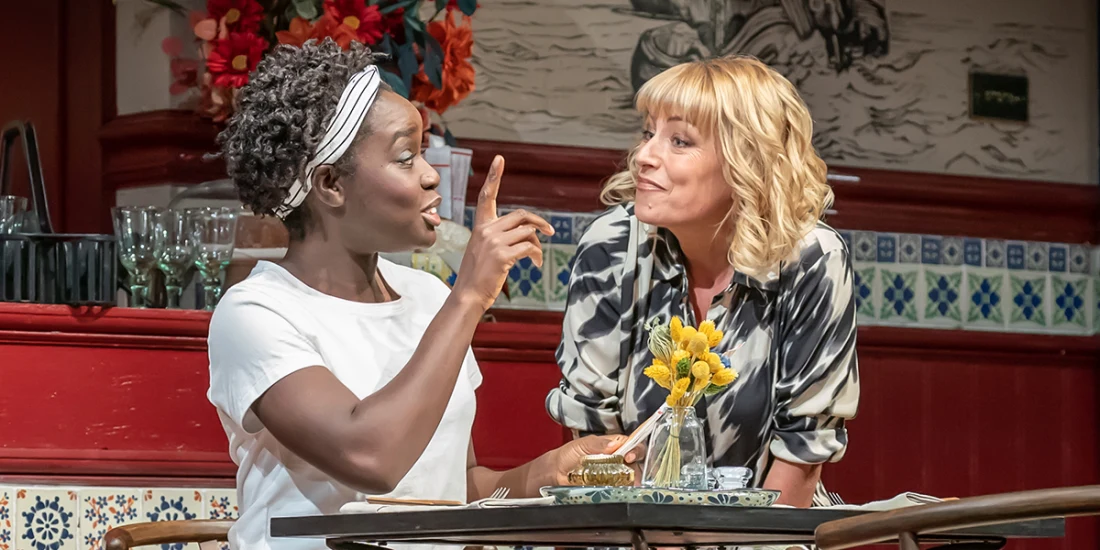'Kerry Jackson' review — an offensive state-of-the-nation sitcom
Kerry Jackson looks unlikely to do for Walthamstow, east London, what Shirley Valentine did for Liverpool, though both plays foreground women finding their way in middle age and looking to satisfy their libidos.
But so offputting is the title character of April De Angelis’s play, and repellent the extent to which those around Kerry are patronised or worse, that you come away baffled as to how this work got so far. There’s not been a more puzzling new play this year, and very few that have been as unsatisfying.
Fay Ripley, sporting a thick estuary accent that is itself often played for laughs, plays Kerry, who is intended, the programme tells us, as an antidote to the likeminded liberals that Walthamstow resident De Angelis has tired of seeing centre stage. “I wanted to put someone different on stage,” the author of such fine plays as Jumpy quite sensibly explains in a programme interview, so as to let her characters dictate the story.
Why is it then that so much of Kerry Jackson seems inauthentic and often times ridiculous, as if the characters had been conceived purely to exhibit a careful cross-section of conflicting traits that somehow might coalesce?
By the time the play has dispensed with a homeless person who exists within the gerrymandered writing only so he can die, playgoers may start to wish that they, rather as Kerry herself at one point does, had cosied up instead to Ibsen’s A Doll’s House. (This enquiry into the dramatic canon from a woman who says she doesn’t know what a sociologist is.)
Ardent Leave voter Kerry is sufficiently European-minded that she decides to partake of Walthamstow’s gentrification by opening a tapas bar there called El Barco, presumably so that cheap laughs can be gleaned from this newfound proprietor’s tortured pronunciation of the Spanish wines she serves. The eatery is in “Walthamstow village”, and Kerry protracts that second word into within an inch of its mock-Gallic life.
Her staff at first consists solely of a Black chef, Athena (the likeable Madeline Appiah), who somehow sticks it out with Kerry to the final curtain, even if most employees in this situation would have run a mile at the first opportunity. The complication here is that Athena is working illegally, so doesn’t have the freedom to take flight.
Also on the payroll, albeit funded by her philosophy-loving father, is a brainy student called Alice (Kitty Hawthorne), who is spending her gap year grieving the death of her mum and whose liberal-leaning dad, Stephen (Michael Gould), is having a fling with Kerry.
She, in turn, has an additional suitor in an ex-policeman, Warren (Gavin Spokes), whose own xenophobia gets a work-out as people turn on a dime from the abrasive to the sentimental and back again, various karaoke interludes there to jolly things along like something out of Mamma Mia!
There’s a (literally) distasteful culinary segue late in the second act guaranteed to put spectators off their dinner, alongside token nods in the direction of sexual harassment, white privilege, and, if you please, Naomi Wolf’s The Beauty Myth: apparently no one told this assemblage that the author of that seminal 1990 work some while ago realigned herself as a conspiracy-minded anti-vaxxer so doesn’t these days carry a whole lot of weight.
Most troubling, at least for me, is the inclusion of a local homeless man, Will (Michael Fox), who is troublingly derided for his lavatorial habits and “dirty face” when in fact the character here gives no indication of living rough at all. (Fox looks clean as a whistle.)
The marginalised in today’s society are so rarely given stage time that it’s a shame to find Will so devalued, of use mainly for the gratuitous ad hoc funeral prompted by his death when suddenly he is made to be of consequence. (That scene, too, is played for an ugly, crass humour worsened by not allowing the character a right of reply.)
Indhu Rubasingham, the director, oversaw the triumphant National Theatre premiere earlier this year of The Father and the Assassin, which returns to the repertoire next year, and one can only assume that she was hamstrung on this occasion by writing that seems to come with an inbuilt laugh track.
Cold Feet alumna Ripley, in a rare return to the stage, certainly gives the enterprise her all, and you feel an attempt made here and there to raise Kerry to the so-awful-she’s-wonderful status of, say, Beverly in Abigail’s Party: alas, no such luck.
But as Richard Kent’s turntable set swerves this way and that, so does a putative state-of-the-nation sitcom that at least deserves credit for being an equal opportunity offender: Warren, on cue, does a cringe-making faux-Polish accent.
The final scene posits a way forward for two antithetical personalities that is entirely preposterous. No matter: By that point, I’d clocked Kerry’s self-comparison to “a bad fairy” – in which case perhaps she’d be more at home in the musical Hex next door.
Kerry Jackson is at the National Theatre to 28 January.
Photo credit: Madeline Appiah (Athena) and Fay Ripley (Kerry) in Kerry Jackson at the National Theatre (Photo by Marc Brenner)
Originally published on
